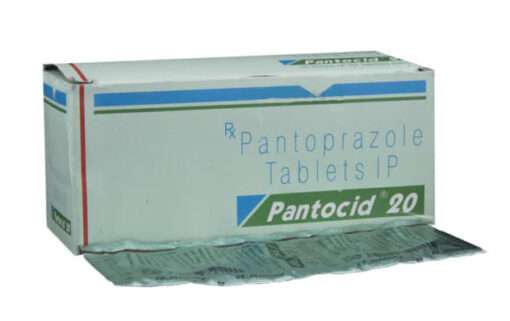Description
Pantocid, also known as pantoprazole, is a medication that belongs to a class of drugs called proton pump inhibitors (PPIs). These drugs work by reducing the amount of acid produced in the stomach, which can help relieve symptoms associated with gastroesophageal reflux disease (GERD), peptic ulcers, and other conditions related to excess stomach acid.
Some key points to note about Pantocid (pantoprazole) include:
- Dosage: Pantocid is available in various forms, including tablets, oral granules, and injections. The dosage will depend on the specific condition being treated and the severity of your symptoms. Always follow the prescribed dosage and duration of treatment as recommended by your healthcare provider.
- Side effects: Common side effects of Pantocid may include headache, dizziness, diarrhea, abdominal pain, and nausea. In rare cases, more severe side effects such as bone fractures, kidney problems, or vitamin B12 deficiency may occur. Consult your healthcare provider if you experience any adverse effects.
- Precautions: Inform your healthcare provider about any medical conditions you may have, as well as any medications or supplements you are currently taking. This will help your healthcare provider determine whether Pantocid is the appropriate treatment for you and if any precautions or adjustments to your dosage are necessary.
- Drug interactions: Pantocid may interact with certain medications, such as antacids, antibiotics, or antifungal medications. Inform your healthcare provider about all medications and supplements you are currently taking to avoid potential interactions.
- Pregnancy and breastfeeding: Pantocid is considered safe for use during pregnancy and breastfeeding, but it is essential to consult your healthcare provider before taking any medication while pregnant or breastfeeding. They can provide guidance on the appropriate dosage and potential risks associated with Pantocid use during this time.
By following these guidelines and consulting with your healthcare provider, you can safely and effectively use Pantocid to manage your symptoms and improve your overall quality of life.
BENEFITS:
Some benefits of using Pantocid include:
- Relief from heartburn and acid reflux: Pantocid can help alleviate the burning sensation in the chest and throat caused by acid reflux.
- Healing of stomach and intestinal ulcers: By reducing stomach acid, Pantocid can help promote healing of ulcers in the stomach and intestines.
- Prevention of stomach ulcers: In people taking nonsteroidal anti-inflammatory drugs (NSAIDs) for long periods, Pantocid can help prevent the development of stomach ulcers.
- Helping with H. pylori infection: Pantocid is often used in combination with antibiotics to treat H. pylori infections, which can cause ulcers.
- Management of Zollinger-Ellison syndrome: Pantocid can help manage the symptoms of this rare condition, which causes excessive stomach acid production.
SIDE EFFECTS:
Pantocid, also known as pantoprazole, is a medication that belongs to a class of drugs called proton pump inhibitors (PPIs). These drugs work by reducing the amount of acid produced in the stomach, which can help relieve symptoms associated with gastroesophageal reflux disease (GERD), peptic ulcers, and other conditions related to excess stomach acid.
Some common side effects of Pantocid may include:
- Headache
- Dizziness
- Diarrhea
- Abdominal pain
- Nausea
- Vomiting
- Flatulence
- Dry mouth
- Constipation
In rare cases, more severe side effects may occur, such as:
- Kidney problems
- Bone fractures
- Vitamin B12 deficiency
- Low magnesium levels
- Increased risk of infections
If you experience any adverse effects while taking Pantocid, it is essential to consult your healthcare provider. They may adjust your dosage or recommend an alternative treatment if necessary. Always inform your healthcare provider about any medical conditions you may have and any medications or supplements you are currently taking to minimize the risk of side effects and ensure the safe and effective use of Pantocid.
PRECAUTIONS:
Pantocid, also known as pantoprazole, is a medication used to treat conditions related to excess stomach acid. It is essential to be aware of certain precautions before using Pantocid:
- Allergies: If you have had an allergic reaction to pantoprazole or any other proton pump inhibitors in the past, inform your healthcare provider before starting Pantocid.
- Medical Conditions: Inform your healthcare provider about any medical conditions you may have, such as liver disease, kidney disease, or osteoporosis, as Pantocid may need to be used with caution or adjusted dosages.
- Pregnancy and Breastfeeding: Pantocid should only be used during pregnancy or breastfeeding if the benefits outweigh the risks. Consult your healthcare provider before using Pantocid if you are pregnant, planning to become pregnant, or breastfeeding.
- Drug Interactions: Pantocid may interact with other medications, such as blood thinners, antifungal drugs, or certain antibiotics. Inform your healthcare provider about all medications and supplements you are taking to minimize the risk of interactions.
- Long-term use: Prolonged use of Pantocid may increase the risk of certain side effects, such as kidney problems, bone fractures, vitamin B12 deficiency, and low magnesium levels. Your healthcare provider may recommend periodic monitoring of your kidney function, bone density, and vitamin B12 and magnesium levels if you are on long-term Pantocid therapy.
- Age: Older adults may be more sensitive to the effects of Pantocid and may require a lower dosage or more frequent monitoring.
It is crucial to follow your healthcare provider’s instructions and use Pantocid exactly as prescribed. Do not adjust your dosage or stop taking Pantocid without consulting your healthcare provider, as this may exacerbate your symptoms or lead to withdrawal symptoms.






28 reviews for Pantocid 20mg (Pantoprazole)